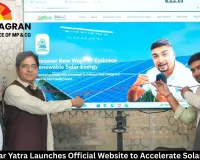Supreme Court Reverses Six-Month-Old Ruling, Opens Door for Post-Facto Environmental Clearances
Digital Desk
In a significant shift, the Supreme Court on Tuesday overturned its own six-month-old judgment that had barred the Centre from granting post-facto environmental clearances to projects operating without prior approval. A two-judge majority held that the earlier decision failed to consider key precedents and government regulations, and referred the matter to a larger bench for final determination.
The ruling effectively lifts the restriction imposed in the May 2025 Vanshakti judgment, which had declared that no mining, industrial, or developmental activity could begin without securing Environmental Clearance (EC) from the Ministry of Environment, Forest and Climate Change (MoEFCC) or the State Environment Impact Assessment Authority (SEIAA).
Chief Justice B.R. Gavai, writing for the majority, said the earlier bench did not examine two crucial precedents Alembic Pharmaceuticals (2020) and D. Swamy vs Karnataka State Pollution Control Boardwhich had allowed limited post-facto approvals subject to penalties. He noted that government rules introduced in 2021 and 2024 explicitly permit post-facto EC for activities allowed under law, provided violators pay fines.
The CJI added that invalidating approvals already granted and ordering demolition of large structures would be contrary to public interest and could worsen environmental harm rather than mitigate it. The Vanshakti ban, he said, created an “inequitable situation” by protecting old post-facto approvals while prohibiting new ones.
Justice K. Vinod Chandran concurred, arguing that the government has the authority to relax procedural requirements in special cases. He cautioned that rigid enforcement would halt multiple ongoing projects and lead to severe economic consequences.
Justice Ujjwal Bhuiyan dissented, insisting that prior EC is mandatory and that post-facto clearances violate earlier landmark rulings such as Common Cause (2018). He rejected the need for review, saying the May 2025 judgment was consistent with established environmental jurisprudence.
With Tuesday’s verdict, post-facto approvals can once again be issued until the larger bench settles the legal question, keeping regulatory uncertainty alive for industries and environmental groups alike.






.jpg)




